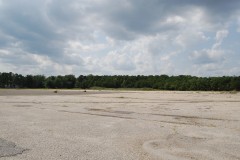A developer in Brick does not want a build a hotel on Route 70, while just five miles up the road in Wall Township, a plan to build a 199 room hotel is meeting opposition from neighbors in a high-end condominium complex.
“He says he doesn’t want to build a hotel there,” said Brick Mayor John Ducey, of Jack Morris, who owns M&M Realty Partners with Joe Marino. Ducey said last week that he would act to terminate the agreement with M&M.
In early September, a subsidiary of Amboy Bank filed applications with Wall Township to build a 199 room extended stay hotel that would feature a conference room, fitness center and indoor pool, the Asbury Park Press reported last week. The bank took over the property on which the hotel would be built, located near the intersection of Route 70 with routes 35 and 34, after its developer died shortly before the real estate crisis of 2008 emerged. About half of the planned 4,000 square foot, $1 million condominiums were built, and most of them are now worth hundreds of thousands of dollars less than they were during the real estate bubble, leading to the proposed hotel plan, the article said. The condominium residents who are already there, however, are attempting to block construction of the hotel.
|
|
M&M holds the current redeveloper’s agreement with Brick at the former Foodtown site off Route 70. In last week’s termination announcement, Ducey said that he was seeking to end the agreement with M&M since the company had failed to meet several deadlines and make an escrow deposit. Since the agreement was forged between the township and M&M in 2010, the township-owned site has remained vacant, as well as a source of controversy with residents calling – sometimes loudly – for a taxable property to be built there.
Does the Wall Township proposal breathe life into the idea that a hotel could work?
“The redevelopment plan, as it stands now, calls for a hotel to be built there,” said Ducey. “It has to be at least 100 rooms, but aside from that, the builder can put whatever he wants there.”
M&M, instead, wants to build a 192 unit condominium complex, about 19,000 square feet of commercial space and 72 additional rental units. But five miles north, the Amboy subsidiary wants to build a 199-room hotel, ironically, instead of completing an age-restricted condominium complex. In order for that type of project to be allowed, the township council would have to vote in favor of changing the agreement, which currently calls for a full service hotel.
Would a Different Type of Hotel Work in Brick?
The redeveloper’s agreement in force in Brick requires what is known as a “full service” hotel. That normally means an on-site restaurant and a variety of other amenities, including a bar, pool and banquet hall. M&M commissioned a study on whether a full service hotel would be viable in Brick, and the study’s authors said the economics behind such an operation would not work out. Some residents and township officials have posed the question as to whether a smaller hotel with a banquet hall would be a better option.
“This redevelopment plan was put together to put a hotel or banquet facility in place,” said former Councilman Michael Thulen – who was on the council when the redeveloper’s agreement was struck – at the meeting where M&M pitched the initial proposal for residential development last year. “The banquet facility was supposed to hold down the hotel.”
The “Friends of Forge Pond” group, a grass-roots community group committed to protecting the pond which is located adjacent to the Foodtown site, has remained open to a hotel and a passive park with public access on the waterfront next door.
Officials are now expecting a period of litigation between the township and M&M following Ducey’s decision to terminate the redeveloper’s agreement. M&M has not paid for the site; Brick would have been owed $7.5 million by M&M once approvals for a project had been obtained.
“We certainly did give the developer an opportunity to go away without a dispute,” said Joseph Baumann, the township’s redevelopment attorney, last week. “We didn’t move to this step lightly, without deliberate thought and consideration, but that’s where we are now. Rest assured, this was not our first choice.”
What is most clear is that residential development at the site is not the preference of township officials.
“The redeveloper signed an agreement with the township and wants to change the terms of that agreement to something that we find unacceptable, primarily more residential development,” said Ducey.












